The All American Melodrama Theater 6/26/2010
Did You Know? - As of 2015, the theater is now CLOSED for business... We really miss going there with the family and having good old fashioned entertainment. We hope they find another venue. (CLOSED As Of 2015)

Turn around as see the Queen Mary!
Did You Know? - The term melodrama refers to a dramatic work which exaggerates plot and characters in order to appeal to the emotions.

Nearby in Long Beach
It may also refer to the genre which includes such works, or to language, behavior, or events which resemble them. It is also used in scholarly and historical musical contexts to refer to dramas of the 18th and 19th centuries in which orchestral music or song was used to accompany the action. The term originated from the early 19th-century French word mélodrame, which in turn is derived from Greek melos (music) and French drame (drama).
The All American Melodrama Theater provides "Old Fashioned", live entertainment fun for the whole family! Ragtime piano tunes fill the air of our Victorian style theatre, that features comfortable seats and cozy cabaret tables. The delightfuly themed theatre is located in Shoreline Village just across the bay from the Queen Mary and the Aquarium of the Pacific. The All American Melodrama and Music Hall was really a load of fun and we plan to bring friends back.
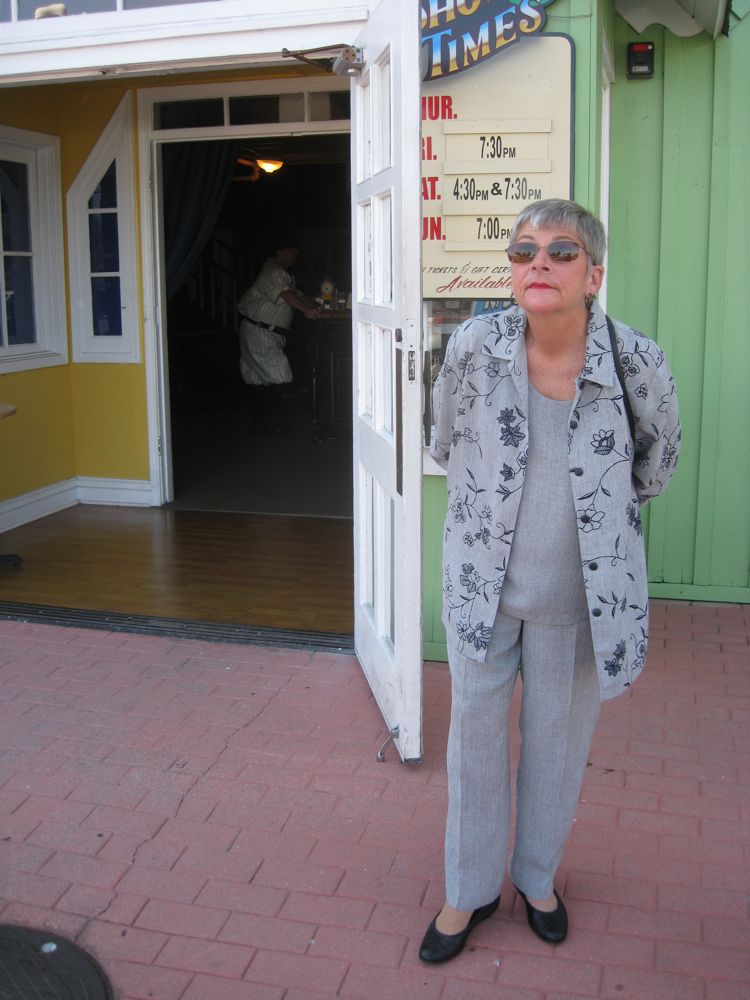
We arrive at 4:15 for the 4:30 performance

Remember this?
Did you know? - The Victorian stage melodrama featured a limited number of stock characters: the hero, the villain, the heroine, an aged parent and a comic man engaged in a sensational plot featuring themes of love and murder. Often the good but not very clever hero is duped by a scheming villain, who has eyes on the damsel in distress until fate intervenes at the end to ensure the triumph of good over evil.
The sensation novels of the 1860s and 1870s were fertile material for melodramatic adaptations. A notable example of this genre is Lady Audley's Secret by Elizabeth Braddon adapted, in two different versions, by George Roberts and C.H. Hazlewood.
In film, the term 'melodrama' or more colloquially 'meller'[12] denotes a subgenre of the drama film which generally depends on stereotyped character development, interaction, and highly emotional themes. Melodramatic films tend to use plots that appeal to the heightened emotions of the audience, often dealing with "crises of human emotion, failed romance or friendship, strained familial situations, tragedy, illness, neuroses, or emotional and physical hardship". Film critics sometimes use the term "pejoratively to connote an unrealistic, pathos-filled, campy tale of romance or domestic situations with stereotypical characters (often including a central female character) that would directly appeal to feminine audiences.
Let's Go In!

The actors also are the staff of the theater... Great group!

The All American Melodrama take you out to the ballpark as we present our comedic, melodramatic tribute to "The National Past Time." Cheer for the Sludgeville Sluggers as they try to win the big game before nefarious villain, Basil Batcrack, tears down the ballpark. Fun for the whole family! Plus every show features our musical, vaudeville revue,
"Extra Innings: Baseball's Greatest Hits"
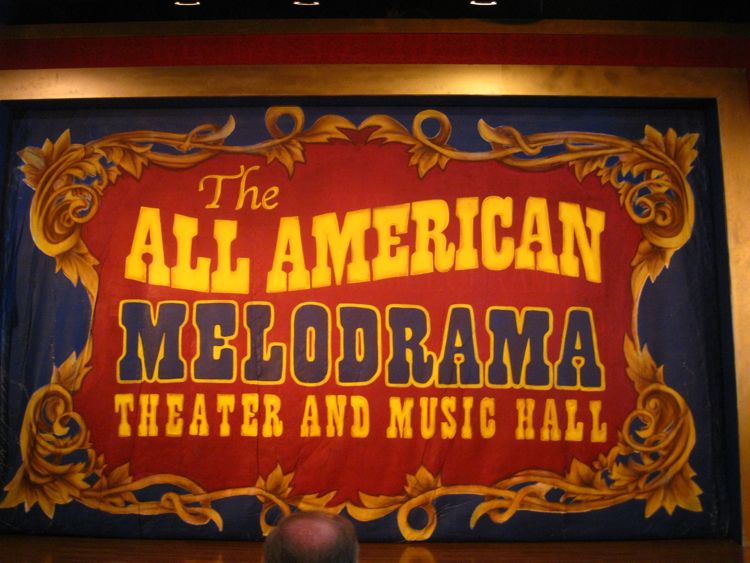
Fun for all!
Let The Fun Begin
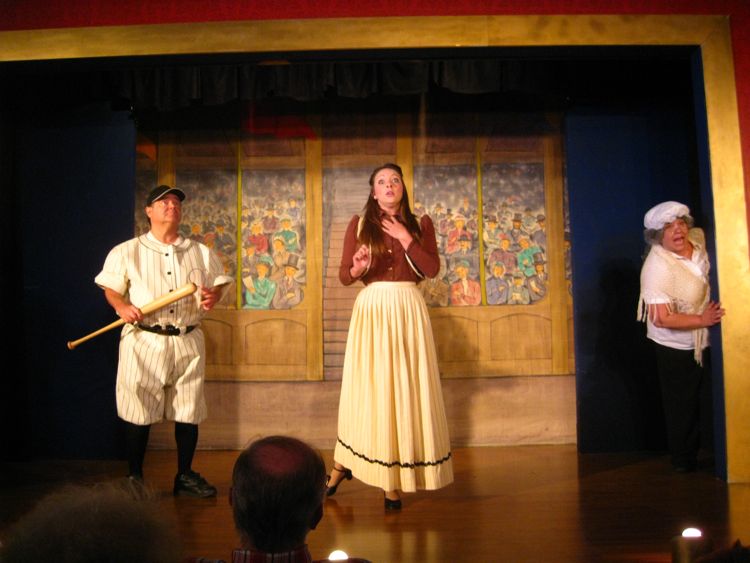
The Coach and Penny Less get a message from Mom
Did you know? - In sport as well as theater, a utility player is one who can play several positions/rolls competently, a sort of jack of all trades.
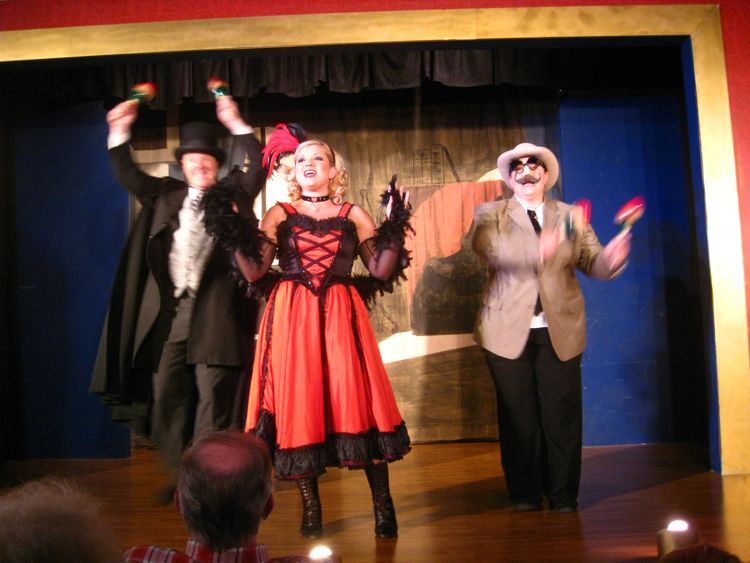
Don't ask; Don't tell
Did you know? - Hubba Hubba - Used to express approval, pleasure, or excitement. This is very old slang used by a guy when he sees a pretty girl.

She (Carmen Gettit) charms the men right out of their contracts

Boo Hiss Boo... Basic is being naughty
Half Time Break... A View Out The Door

We took a short 10 minute walk

Pictures with the coach


Beautiful day!
Part Two - The Plot Thickens
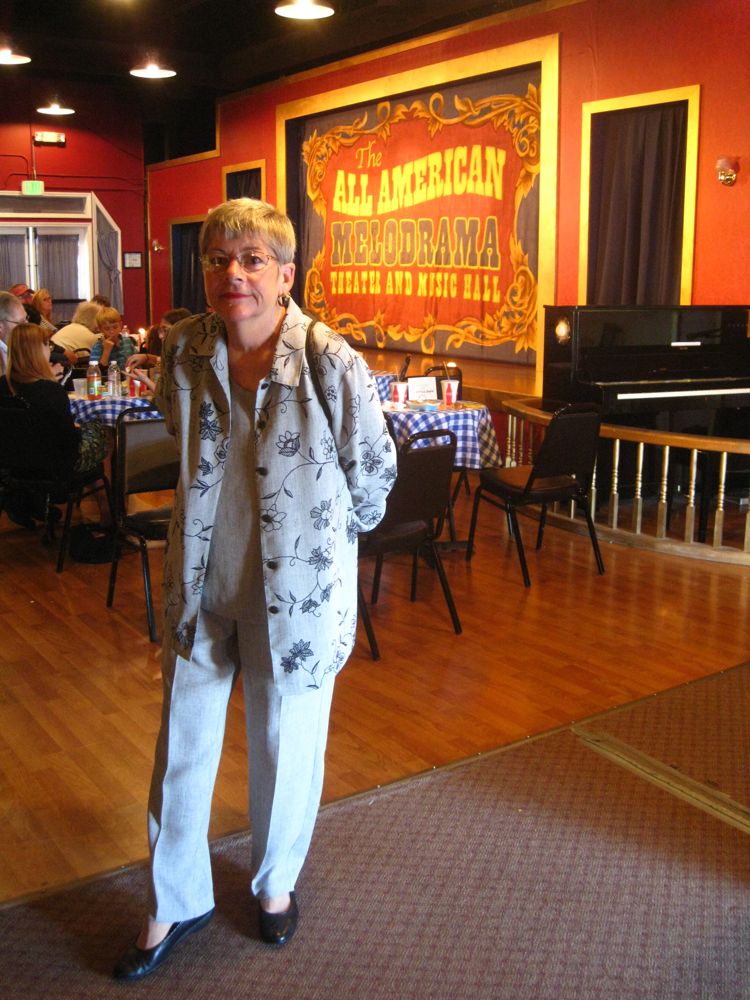
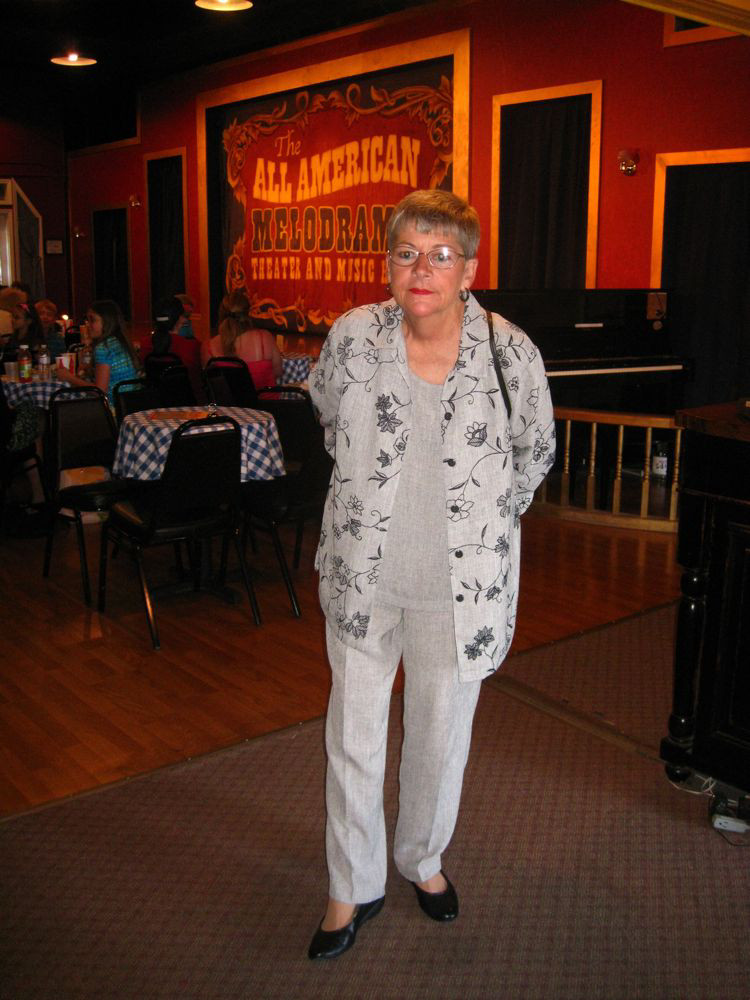

Sneaking the documents from Batrack's safe
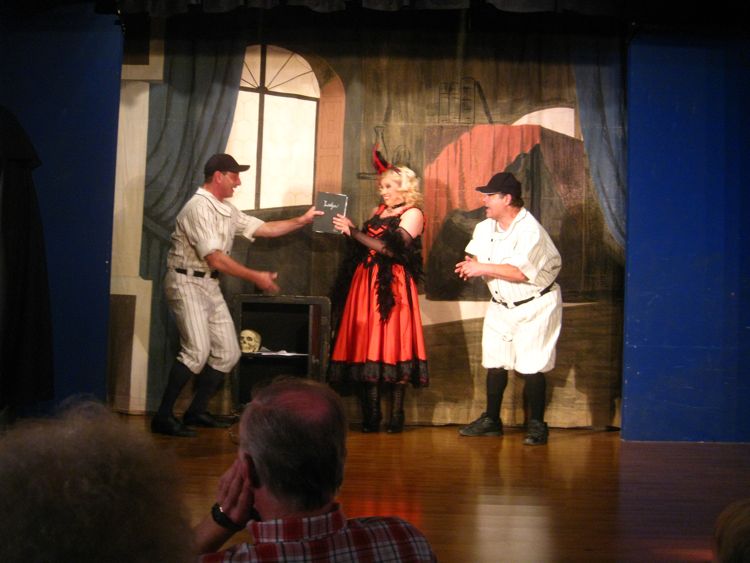
Ah ha! Carmen has the ledger
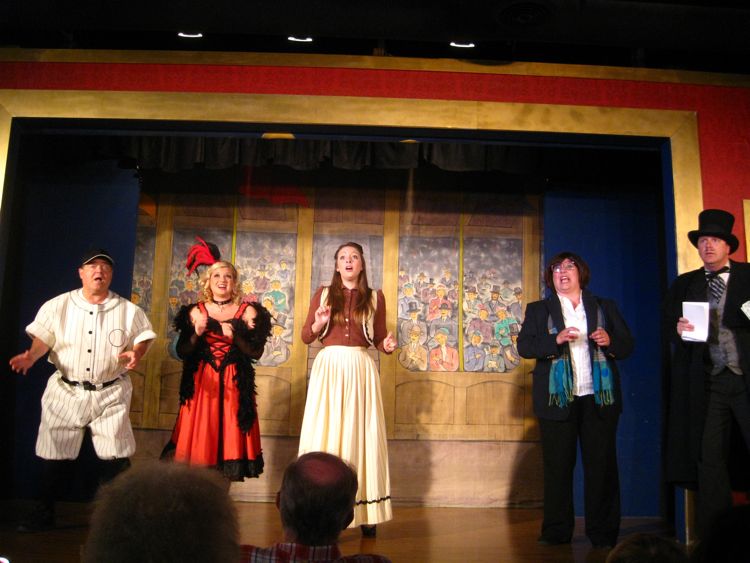
Penny Less and the ballpark are saved

Curses
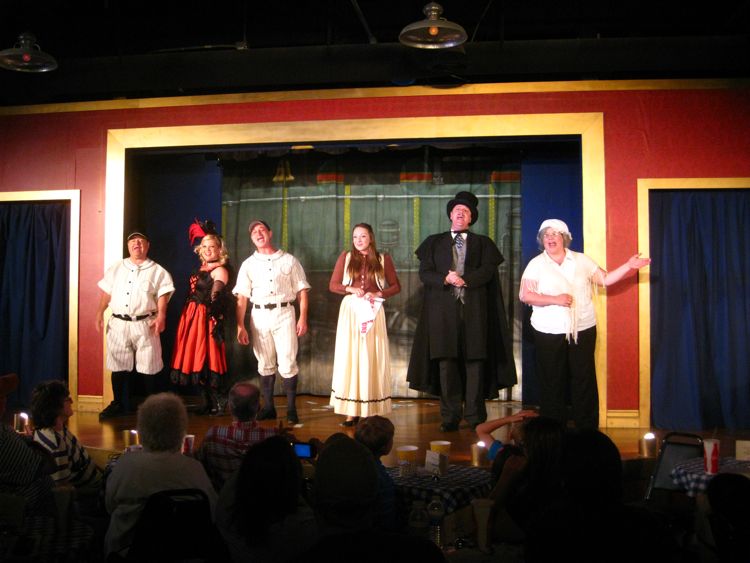
The Olio is coming... Stick around!
Time To Stretch The Legs

The Olio Begins
Did you know? - Vaudeville was a theatrical genre of variety entertainment in the United States and Canada from the early 1880s until the early 1930s. Each performance was made up of a series of separate, unrelated acts grouped together on a common bill. Types of acts included popular and classical musicians, dancers, comedians, trained animals, magicians, female and male impersonators, acrobats, illustrated songs, jugglers, one-act plays or scenes from plays, athletes, lecturing celebrities, minstrels, and movies. Vaudeville developed from many sources, including the concert saloon, minstrelsy, freak shows, dime museums, and literary burlesque. Called "the heart of American show business," vaudeville was one of the most popular types of entertainment in North America for several decades.
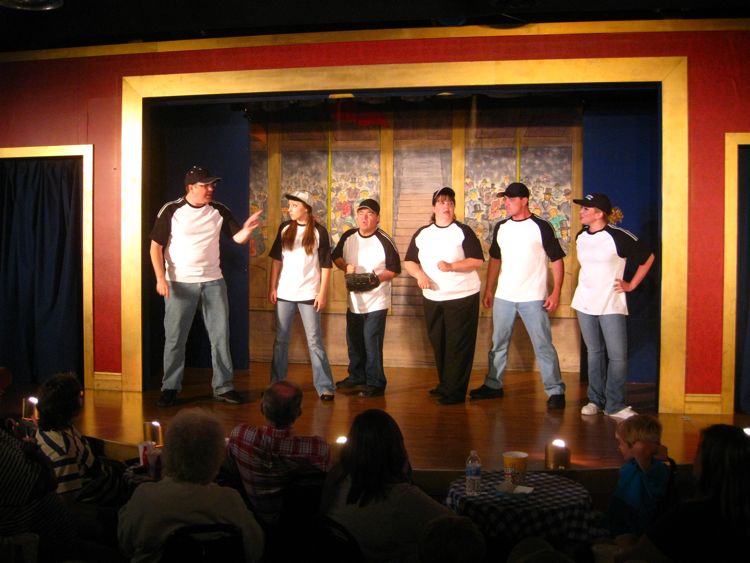
To top off the evening, every Melodrama theater show includes an Olio: "a little something extra." At the All American Melodrama Theater our Olios are vaudeville revues full of song, dance, comedy and lots of audience participation.
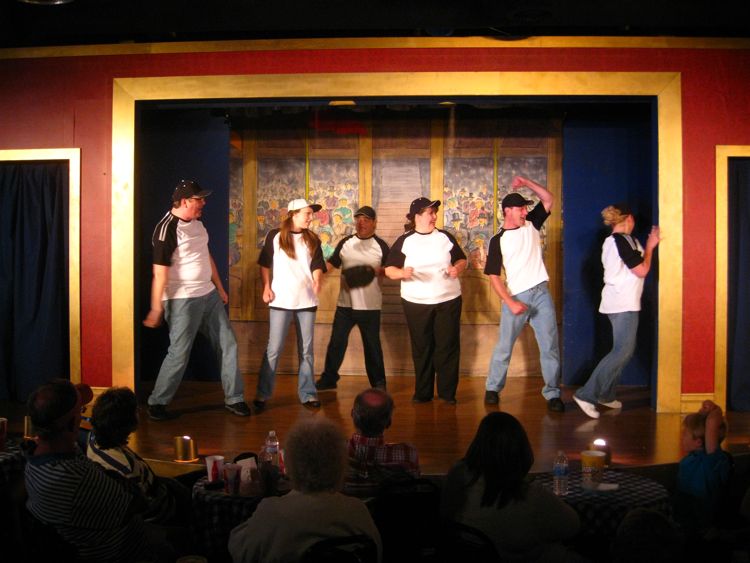
Great fun!
Did you know? - The origin of the term is obscure, but is often explained as being derived from the expression voix de ville, or "voice of the city." Another plausible etymology finds origins in the French Vau de Vire, a valley in Normandy noted for its style of satirical songs with topical themes. The term vaudeville, referring specifically to North American variety entertainment, came into common usage after 1871 with the formation of Sargent's Great Vaudeville Company of Louisville, Kentucky. It had little, if anything, to do with the Comédie en vaudeville of the French theatre.
